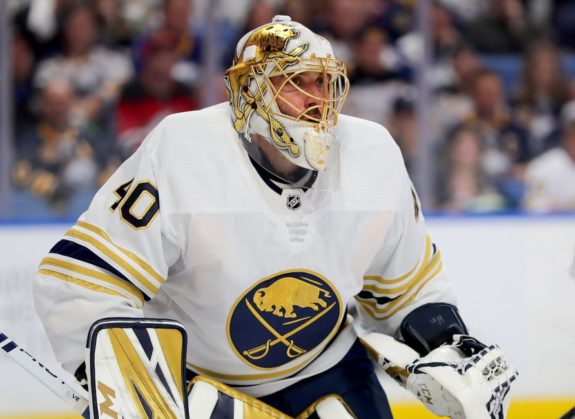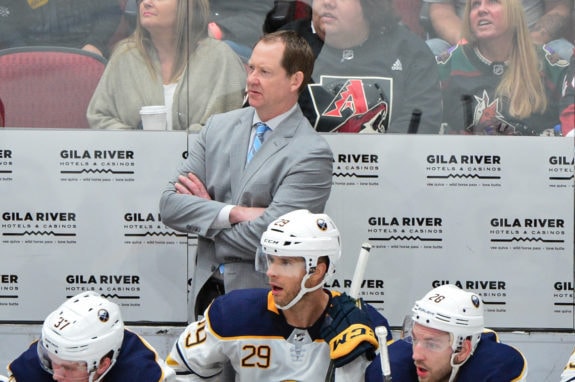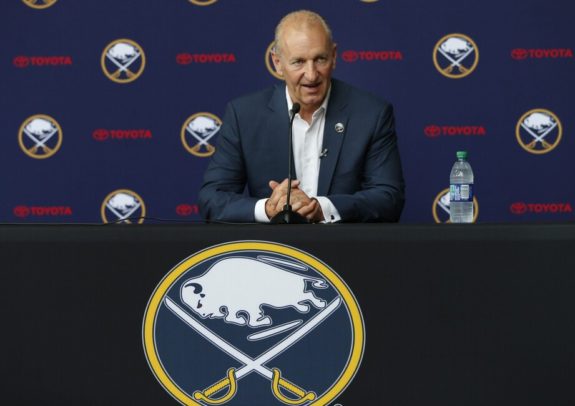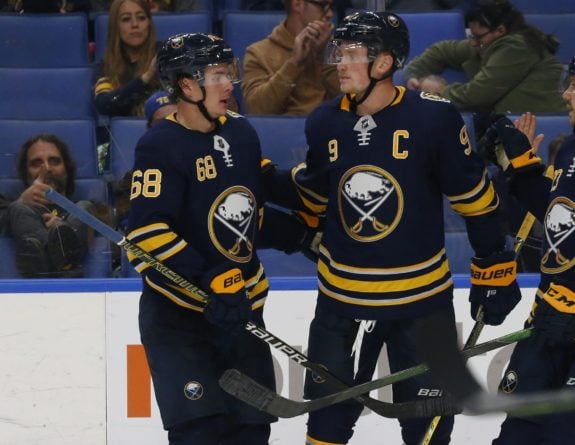Being atop the NHL shouldn’t be a surprise for the 7-1-1 Buffalo Sabres or their fans. Unfortunately, based on recent history, what would be truly shocking is if they managed to stay there.
After all, the Sabres were in a similar position last season, when they enjoyed a franchise-record-tying 10-game winning streak up until late November, at which point they were 17-6-2. Then the bottom fell out on the Sabres, as they went 16-33-8 the rest of the way to miss the playoffs.
So, sharing the league lead in points heading into Tuesday night action? Been there, done that. Here’s why 2019-20 will bring about positive change.
Fewer Smoke and Mirrors for Sabres
If you look back at that infamous 10-game winning streak, it was clear in retrospect the success wasn’t going to last. Nine of the wins were by a single goal. Seven of those came in overtime or a shootout.
Think about that for a second. Had all the bounces gone their opponents’ way instead of that of the Sabres during the streak, which is what effectively happened, they would have been 3-0-7 over the 10 games instead. Furthermore, we’re not just talking about single shots. The Sabres only outshot their opponents twice in the 10 games, getting outshot 344-315 overall. Things are somewhat different this time around.
The Sabres have outshot opponents in five of their games. They’ve still been outshot 298-270. That’s admittedly just as bad, but the disparity can largely be attributed to two specific games: a 3-0 shutout victory care of Carter Hutton over the Los Angeles Kings (outshot 24-47) and a 4-3 overtime loss to the Columbus Blue Jackets (outshot 18-44).

Obviously, the Sabres aren’t as dominant as their record indicates. The underlying stats prove that, but they aren’t as bad as last season, indicating a chance for sustained success. More importantly, following this blistering start, they indicate a realistic shot at a playoff spot.
Krueger in, Housley out
In case it wasn’t readily apparent, Ralph Krueger isn’t outgoing-bench-boss Phil Housley.

When the Sabres hired Housley to take the reins as the team’s new head coach for 2017-18, they were hoping the rookie head coach would be able to find success similar to that he had found as an assistant with the Nashville Predators. He didn’t. Following two losing seasons rife with questionable deployment decisions, the results were underwhelming.
For Krueger’s part, if Barry Trotz can win the Jack Adams Award by coaching his team to successfully play low-event hockey, so can he elsewhere in New York State. At the very least, the Sabres have a better idea of what they’ve got in Krueger based on the single season he coached the Edmonton Oilers in 2012-13.
Granted, the Oilers missed the playoffs that lockout-shortened season with a 19-22-7 record. For what it’s worth, it was the first time they finished higher than fourth in the old Northwest Division since 2005-06 when they reached the Stanley Cup Final. Playing a schedule uniquely made up of tougher Western Conference teams, no less.
This isn’t about making excuses. It’s about giving a fair assessment of Krueger’s performance as a head coach up to now, when the Sabres didn’t have that luxury with Housley. For starters, consider how Krueger was unceremoniously fired after a single season and the state of the Oilers as a whole. Making that kind of judgment call only to hire another rookie head coach (Dallas Eakins) is kind of crazy. Well, Krueger is a rookie no longer.

The Oilers have only made a single playoff appearance since their 2006 playoff run. In retrospect, there’s every reason to believe Krueger got the most out of the Oilers (‘Major mistakes of Edmonton Oilers management? One was axing Ralph Krueger, now head coach of the Buffalo Sabres’, Edmonton Journal – 15/5/17) that he or anyone could have under those same circumstances. It was a badly run organization that, even with Connor McDavid on the roster, is only now finding its feet, at the top of the league standings with the Sabres in this season’s early going.
If you can finally believe the Oilers are for real, and it would be fair to do so considering the McDavid factor, why not these Sabres under Krueger? They may not have the best player in the world, but they do have a much deeper lineup.
Not Your Older Brother’s Sabres
From the bench out, it’s easy to see why things will be different in 2019-20 for the Sabres. It’s a different team, after all. Oh, many of the players are the same, but there’s also been a great deal of turnover.
There’s no more unjustified reliance on Tage Thompson, who was wisely sent down to the American Hockey League to start the season. For all intents and purposes, he’s been replaced by super-rookie Victor Olofsson, who has one less goal (six) in nine games than Thompson had all of last season.

Fellow newcomers Marcus Johansson and Jimmy Vesey have joined the forward group. They’re joined by the likes of Casey Mittelstadt who’s a year older and likely better. The same goes for Rasmus Dahlin, who’ll be expected to help lead a defensive corps retooled by the likes of Henri Jokiharju and Colin Miller.
That’s saying nothing of veteran talents like Jack Eichel, Sam Reinhart and even Rasmus Ristolainen (for as long as Ristolainen is here anyway). Each of them is still 25 or younger. So, objectively speaking, there’s a lot to like on this team.
If last season’s collapse weren’t so fresh in the minds of fans, they’d have good, objective reason to be optimistic that these Sabres are for real. After all, as mentioned earlier, this is a different team. It will have a different result. A better result, to be clear.